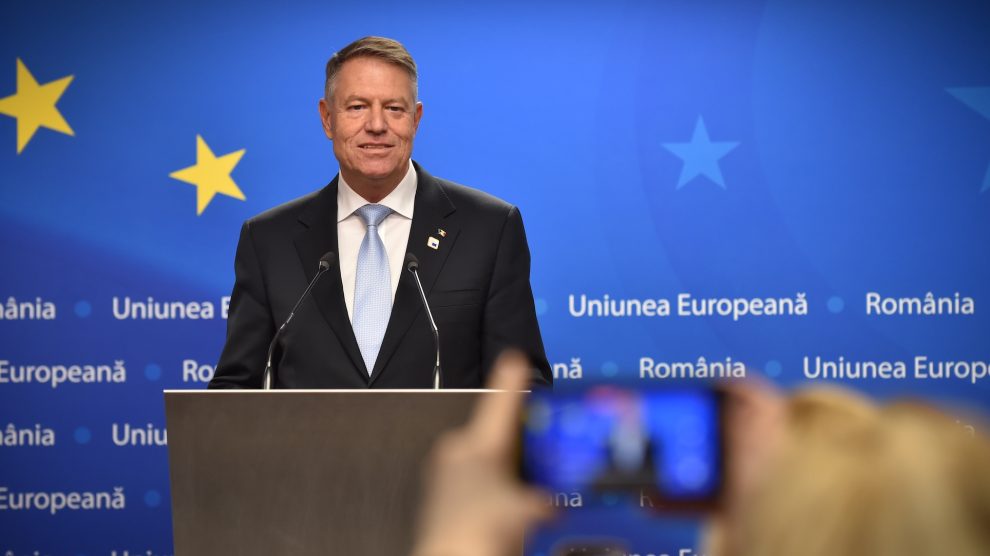Romania’s President Klaus Iohannis believes that politicians from Central and Eastern Europe are missing out on Europe’s top jobs. How accurate is his assessment?
In football it’s known as a ‘come and get me’ plea. A player unhappy at their current club, possibly approaching the end of a contract, makes it abundantly clear (either in an interview or by leaking a story to the press) that they feel themselves ready for a new challenge, perhaps at a bigger club.
In much the same way, Romania’s President Klaus Iohannis has been making ‘come and get me’ pleas for several years. Elected in 2019 for a second term in office he cannot run for a third and, at 64 and clearly believing he still has much to offer, has been actively looking for another job for some time.
- Rethinking how to communicate EU enlargement in a year of multiple elections
- Why Bulgarian, Romanian hopes for a ‘mini-Schengen’ were a non-starter
- The EU has been very good for emerging Europe
At various stages in the recent past Iohannis has been touted by friendly sources in the Romanian media as a potential NATO chief, president of the European Commission, president of the European Council, and president of the European Parliament.
His latest ‘come and get me’ plea came on February 7 when he said that the European Union should not repeat the mistakes of 2019, when the bloc’s top jobs (primarily the presidency of the European Commission and presidency of the European Council) went to politicians from Western Europe.
“It would be inadmissible if none of the senior posts went to politicians from the east of the European Union,” said Iohannis, addressing the European Parliament in Strasbourg. “In 2019 the relevant posts were occupied by people from the ‘old’ Europe. They are all competent—that’s not the issue—but the lack of people from the East is one reason why many Europeans feel detached. This mistake must not happen again. The EU must take regional criteria into account.”
According to Radu Magdin, a strategic communications analyst, consultant and former prime ministerial advisor in Romania and Moldova, the upcoming change of leadership in Brussels is naturally mobilising political ambitions within the EU.
“Romania is of course riding this tide, as it is important to secure a seat at the decision-making table, if not nationally, at least for Central and Eastern Europe,” he says. “Of course, Iohannis wants a high-level position for himself so he is overplaying the Eastern argument. However, compared with other possible future EU leaders from the region, such as Estonia’s Prime Minister Kaja Kallas, he has been less present in terms of ideas and thought leadership.”
Does the East get overlooked?
Europe’s top jobs will indeed once again be up for grabs following the next round of elections for the European Parliament, which take place at the beginning of June. But how accurate is the Romanian president’s assessment that the East is overlooked?
While politicians from Central and Eastern Europe (CEE) did indeed miss out on the two top jobs in 2019, they are not without representation at the highest level in Brussels. Four of the European Commission’s six vice-presidents are from the CEE region, including the Slovak Maroš Šefčovič, in charge of the European Green Deal. Olivér Várhelyi, a Hungarian, is in charge of enlargement.
Meanwhile, the head of the European Union’s powerful Public Prosecutor’s Office is, like Iohannis, a Romanian—Laura Codruța Kövesi. (Ironically, under pressure from Romania’s Social Democrats, Iohannis was forced to fire Kövesi from her enormously successful role as Romania’s anti-corruption chief in 2019).
Other competent figures from Central and Eastern Europe have held senior EU positions in the past, not least current Polish Prime Minister Donald Tusk, who ran the European Council for two terms before returning to national politics.
Plenty of other key global organisations also have little issue with employing competent CEE personnel. Kristalina Georgieva, a Bulgarian, runs the International Monetary Fund. The current deputy secretary general of NATO, Mircea Geoană, is another Romanian (and, rumour has it, might be considering taking a shot at the Romanian presidency himself).
If Iohannis fails to find himself a decent job by the end of year, when his second term in office ends, it will have little to do with discrimination towards the politicians of Central and Eastern Europe.
Photo: Klaus Iohannis at a meeting of the European Council. © European Union.
Unlike many news and information platforms, Emerging Europe is free to read, and always will be. There is no paywall here. We are independent, not affiliated with nor representing any political party or business organisation. We want the very best for emerging Europe, nothing more, nothing less. Your support will help us continue to spread the word about this amazing region.
You can contribute here. Thank you.


